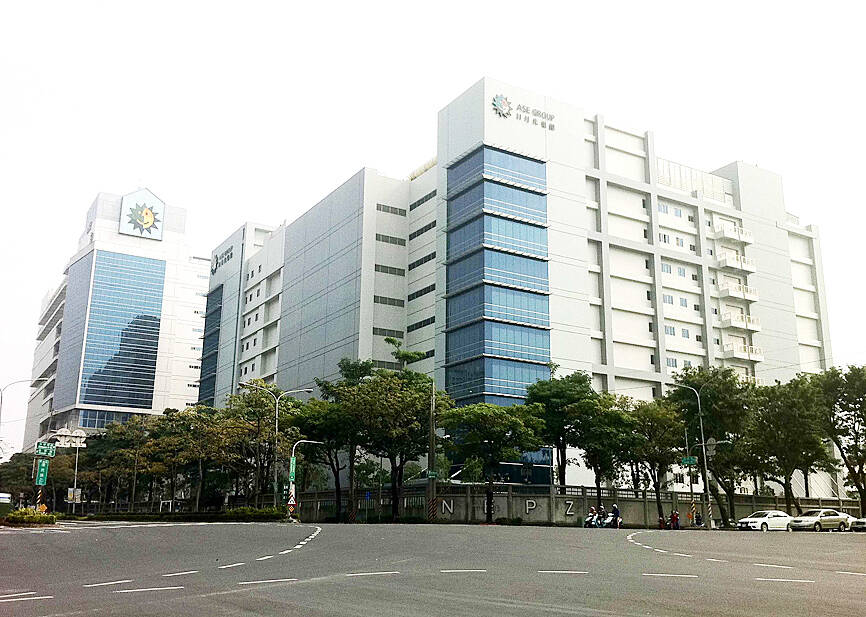ASE Technology Holding Co (日月光投控) yesterday forecast that revenue from its core chip assembly and test manufacturing business would grow by a mid-to-high single-digit percentage sequentially this quarter, due to delays in certain new product launches and customers’ stringent inventory control.
The company generated NT$76.11 billion (US$2.44 billion) in assembly and test manufacturing revenue last quarter, up 3.8 percent from the previous quarter, but down 15 percent from a year ago, ASE said.
Revenue from its electronics manufacturing service business would expand by 20 percent sequentially this quarter from NT$60.42 billion last quarter, it forecast.

Photo: CNA
The assembly and test manufacturing business’ gross margin is forecast to expand by 0.75 to 1 percentage points this quarter from 21.2 percent last quarter, on the back of higher factory utilization, ASE said, adding that factory usage would rise to average 65 percent this quarter from 60 percent last quarter.
The Kaohsiung-based company also gave a more “conservative” outlook for the second half of the year amid extended inventory adjustments by customers.
“Now most customers see soft market conditions. People are getting more cautious,” ASE chief financial officer Joseph Tung (董宏思) told an online conference yesterday. “Going into 2024, I think things will improve a bit. We are expecting much healthier growth in 2024.”
Despite challenges ahead, ASE still targets generating twice as much revenue as the rest of global semiconductor industry, excluding the memorychip sector, Tung said.
At the conference, investors expressed interest in how ASE would benefit from the recent artificial intelligence (AI) hype, but ASE said AI-related products only accounted for a low-single-digit percentage of its total assembly and test manufacturing business.
“Right now, AI is still in its early stage. It will take time for us to see growth in this segment,” Tung said.
The company would invest in this area when AI proliferates to a broader range of applications, ASE said, adding that AI is a catalyst for the next super-cycle of the semiconductor industry.
ASE said it has initiated collaboration with foundry maker United Microelectronics Corp (聯電) to produce silicon interposer wafers, which is a key part of the advanced CoWoS packaging technology used in AI chips.
Taiwan Semiconductor Manufacturing Co (TSMC, 台積電) has taken the lead in using this technology, with most jobs handled in-house, ASE said.
ASE yesterday posted a 33 percent increase in net profit to NT$7.74 billion for the second quarter, compared with NT$5.82 billion in the first quarter, thanks to higher-than-expected rush orders. On an annual basis, net profit tumbled 52 percent from NT$15.99 billion.
Earnings per share rose to NT$1.8 last quarter from NT$1.36 in the prior quarter, down from NT$3.69 a year earlier.

‘SWASTICAR’: Tesla CEO Elon Musk’s close association with Donald Trump has prompted opponents to brand him a ‘Nazi’ and resulted in a dramatic drop in sales Demonstrators descended on Tesla Inc dealerships across the US, and in Europe and Canada on Saturday to protest company chief Elon Musk, who has amassed extraordinary power as a top adviser to US President Donald Trump. Waving signs with messages such as “Musk is stealing our money” and “Reclaim our country,” the protests largely took place peacefully following fiery episodes of vandalism on Tesla vehicles, dealerships and other facilities in recent weeks that US officials have denounced as terrorism. Hundreds rallied on Saturday outside the Tesla dealership in Manhattan. Some blasted Musk, the world’s richest man, while others demanded the shuttering of his

TIGHT-LIPPED: UMC said it had no merger plans at the moment, after Nikkei Asia reported that the firm and GlobalFoundries were considering restarting merger talks United Microelectronics Corp (UMC, 聯電), the world’s No. 4 contract chipmaker, yesterday launched a new US$5 billion 12-inch chip factory in Singapore as part of its latest effort to diversify its manufacturing footprint amid growing geopolitical risks. The new factory, adjacent to UMC’s existing Singapore fab in the Pasir Res Wafer Fab Park, is scheduled to enter volume production next year, utilizing mature 22-nanometer and 28-nanometer process technologies, UMC said in a statement. The company plans to invest US$5 billion during the first phase of the new fab, which would have an installed capacity of 30,000 12-inch wafers per month, it said. The

Taiwan’s official purchasing managers’ index (PMI) last month rose 0.2 percentage points to 54.2, in a second consecutive month of expansion, thanks to front-loading demand intended to avoid potential US tariff hikes, the Chung-Hua Institution for Economic Research (CIER, 中華經濟研究院) said yesterday. While short-term demand appeared robust, uncertainties rose due to US President Donald Trump’s unpredictable trade policy, CIER president Lien Hsien-ming (連賢明) told a news conference in Taipei. Taiwan’s economy this year would be characterized by high-level fluctuations and the volatility would be wilder than most expect, Lien said Demand for electronics, particularly semiconductors, continues to benefit from US technology giants’ effort

MULTIFACETED: A task force has analyzed possible scenarios and created responses to assist domestic industries in dealing with US tariffs, the economics minister said The Executive Yuan is tomorrow to announce countermeasures to US President Donald Trump’s planned reciprocal tariffs, although the details of the plan would not be made public until Monday next week, Minister of Economic Affairs J.W. Kuo (郭智輝) said yesterday. The Cabinet established an economic and trade task force in November last year to deal with US trade and tariff related issues, Kuo told reporters outside the legislature in Taipei. The task force has been analyzing and evaluating all kinds of scenarios to identify suitable responses and determine how best to assist domestic industries in managing the effects of Trump’s tariffs, he